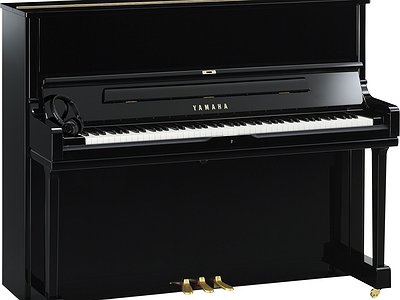Name: Mitchel Van Dinther aka Jameszoo
Nationality: Dutch
Occupation: Producer
Recent release: Jameszoo's Blind is out via Brainfeeder.
Tool of Creation: Disklavier
Designed by: Yamaha
Country of origin: Japan
Became available in: 1987
Jameszoo uses the Yamaha Disklavier on: His new album Blind, to achieve "the precision and the execution of passages unplayable by the human hand."
If you enjoyed this interview with Jameszoo about the Disklavier and would like to explore his work in more depth, visit him on Instagram, Facebook, Soundcloud, and twitter.
We also recommend our more expansive 15 Questions interview with Jameszoo. For an alternative look at the Disklavier, check out our feature about the instrument with Deru.
What was your first encounter with the Disklavier?
The first time I worked with one is a few years ago I believe.
I had already recorded some music with a vorsetzer [a mechanism allowing for automatic movement of a piano's keys] before. The first music I heard for pianola was by Conlon Nancarrow. Hearing that music opened me up to the possibilities of working with such a machine.
Just like any other piece of equipment, the Disklavier has a rich history. Are you interested in it? And if so, what are some of the key points from this history for you personally?
I really like that someone can only partly dictate how something should be put to use. Which is part of the history of these pianolas and disklaviers as well.
What, to you, are some of the most interesting recordings made with te Disklavier?
There are fantastic compositions for pianola and disklavier.
There is quite an extensive list of composers that worked with such machines. Ranging from Stravinsky an Ligeti to James Tenney and Conlon Nancarrow. I would say Tenney and Nancarrow probably inspired me the most.
What interests you about the Disklavier in terms of it contributing to your creative ideals?
It really helped me aesthetically detach from the human aspect.
The Disklavier started to embody the music’s characteristics. It helped me listen to the music without focussing on who is playing.
What are some of the stand-out features from your point of view?
Speed and precision.
Prior to using it for the first time, how did you acquaint yourself with the Disklavier? Will you usually consult a manual before starting to work with a new device – and what was that like for the Disklavier?
It’s fairly easy to work with! I had a manual at hand just to get a sense of how it is routed.
Apart from that I didn’t really use it. I don’t mind slowly learning a piece of equipment through trial and error.
Tell me a bit about the interface of the Disklavier – what does playing it feel like, what do you enjoy about it, compared to some of your other instruments?
The interfaces vary. Some older models have computer attached to it that looks like a small fridge and some newer ones are operated completely through a phone.
After routing it you just connect it via midi cables and decide what needs to be played.
How would you describe the sonic potential of the Disklavier?
It's great! The speed and precision in combination with the sound of a piano can be quite powerful.
In which way does the Disklavier influence musical results and what kind of compositions does it encourage / foster?
I ultimately decide on what ends up in a piece through listening. Working with a disklavier influenced my listening process and therefore the compositions.
Could you describe working with the Disklavier on the basis of a piece, live performance or album that's particularly dear to you, please?
On ‘Bugatti’ for instance, myself and Niels Broos worked on some midi recordings that I arranged afterwards.
When I tried to record these arrangements on piano, the results lacked the stiffness present in the midi version. That's when I decided to work with a Disklavier for that piece.
It helps being in the room with one and then work on the dynamics, timing and velocities.
Some see instruments and equipment as far less important than actual creativity, others feel they go hand in hand. What's your take on that?
Changes in instruments and equipment can offer change in approach. Changing my approach from time to time definitely helps me to work more intuitively.
Every piece of equipment has its own way of influencing the process. Although not always clear on how exactly it changes the music, it definitely does.
In the light of picking your tools, how would you describe your views on topics like originality and innovation versus perfection and timelessness in music? Are you interested in a “music of the future” or “continuing a tradition”?
I’m currently not interested in either of those per se.
I find that my pre conceptualised notions of what the music should become tend to get in the way of something actually interesting coming out of the process. I make music about music and the results vary.




